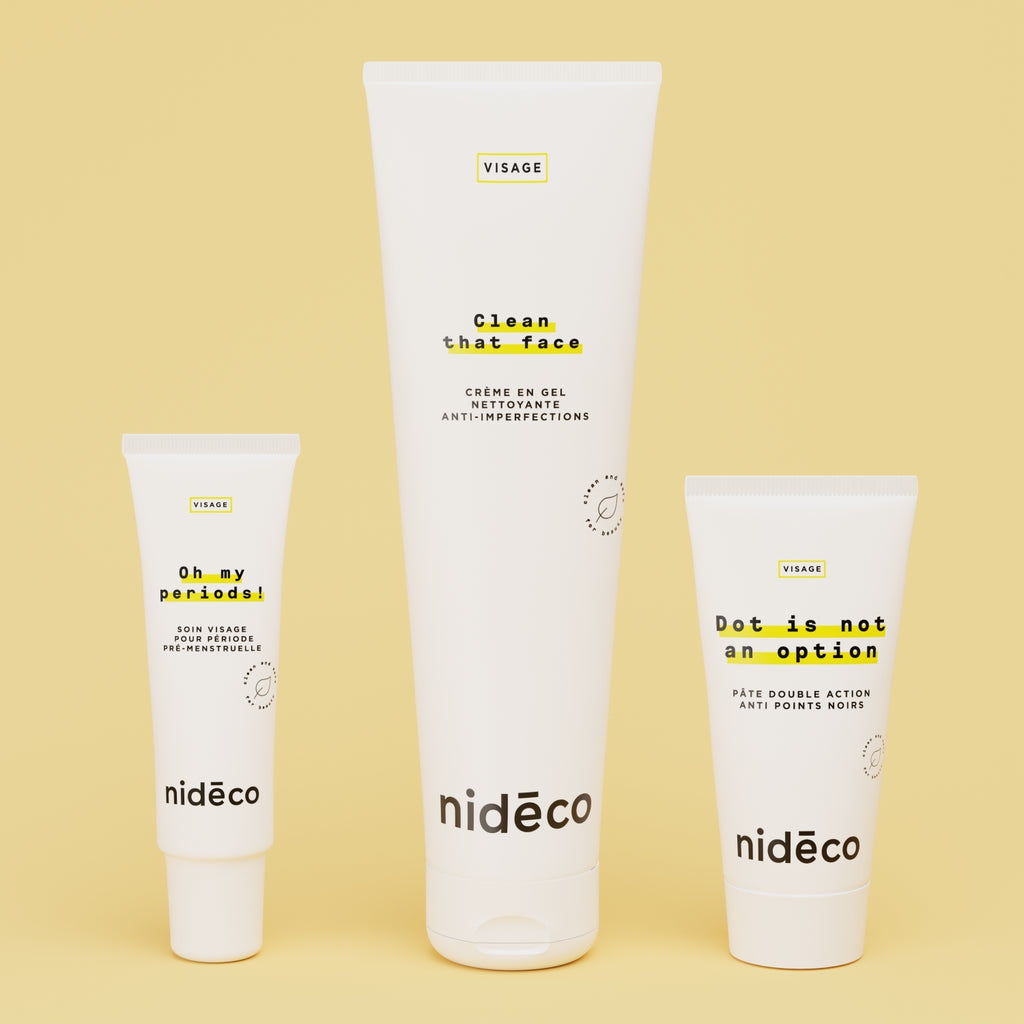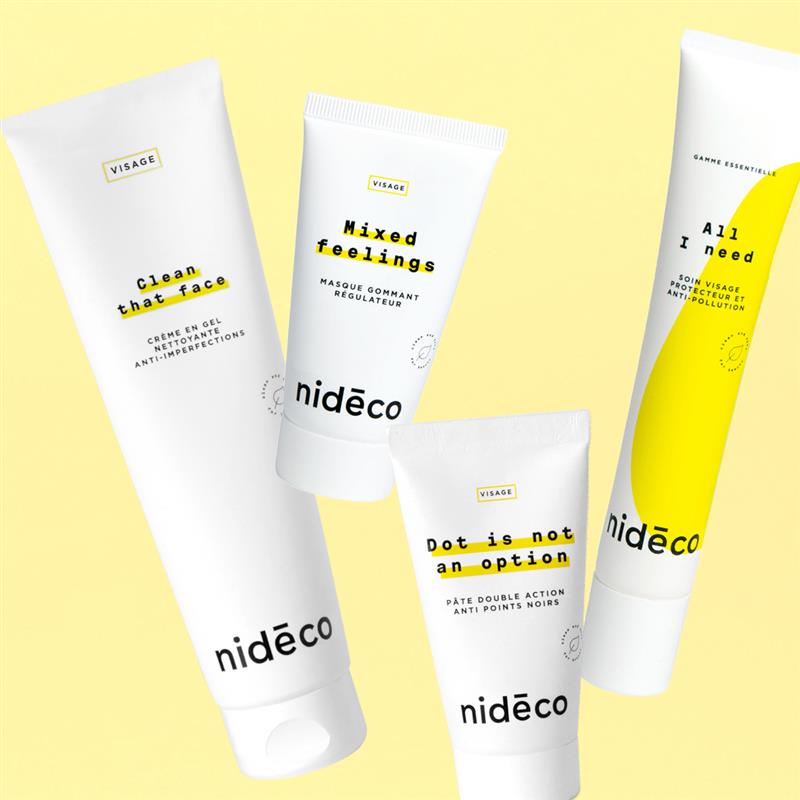Sensitive skin: How to properly cleanse your face?

Are you one of the many people who suffer because of sensitive skin? If so, you know how difficult it can be to clean your sensitive skin and treat blemishes without damaging it or causing irritation.
What is sensitive skin?
❓ S ensitive skin is hyper-reactive skin. In other words, it reacts more than normal skin when subjected to different stimuli. If you have sensitive skin, you may feel tightness, heat, tingling or even itching. These sensations are uncomfortable and can be accompanied by inflammation and unsightly redness. In addition, it can be difficult to find a cosmetic product that suits your sensitive skin and does not cause irritation.
👩🦰 S ensitive skin is not a skin type itself, but a skin condition. Thus, all skin types, whether dry, combination or even oily skin, can be sensitive.
➡️ A lso, the sensitivity of your skin will not be the same throughout your life since it is observed to decrease with age.
Why is our skin sensitive?
🙋 There are a number of factors that can contribute to sensitive skin. For some people, it's genetic; others may develop sensitivities due to certain medical conditions or medications. But even if you don't usually have sensitive skin, it can be triggered by other factors such as:
- External factors such as sunlight, pollution, extreme temperature variations or repeated friction and aggression;
- Psychological factors such as stress or strong emotions;
- Internal factors such as an unbalanced diet or hormones that fluctuate during your menstrual cycle;
- Unsuitable or aggressive skin care or make-up products.
➡️ These stimuli that have no effect on some skin will cause reactions for your sensitive skin. They will be responsible for lowering your skin's tolerance threshold and making it more reactive and irritated.
Choosing your face wash
🧴 If you have sensitive skin, it's important to choose a facial cleanser that is gentle and doesn't cause irritation. For this, it is recommended to use a gentle, non-abrasive and hypoallergenic cleanser. Look for a cleanser made with natural ingredients. These will be gentler on your skin than synthetic ingredients. Also, choose a cleanser that is non-comedogenic, meaning it won't clog your pores.
These products will clean the face without causing redness, itching or burning.
➡️ You should also test the cleanser on a small area of skin before using it on your entire face. Apply a small amount to an inconspicuous area of skin, such as the inside of your wrist, and wait 24 hours to see if there is any redness, swelling, itching or other irritation. If you experience any of these symptoms, stop using immediately and wash the area with soap and water. If there is no reaction after 24 hours, you may continue to use the product as directed.
👉 Choose a natural, gentle, yet effective cleanser that doesn't cause irritation or harshness to your skin.
Clean That Face
🧼 Clean That Face Is a gentle, non-aggressive cream cleanser. Specially formulated to cleanse sensitive skin without creating irritation or itching, this gel does not cause redness or itching.
🧴 Without aggressing your skin, the cleanser Clean That Face Cleanser is ultra-efficient and helps you treat your blemishes as it purifies and rebalances the epidermis. Enriched with sugar foam to sanitize your face, this cleansing cream blends lavender extract and Aloe vera to deeply cleanse your skin.
The right gestures to clean your skin
✔️ After choosing a gentle cleanser for your face, it's important to adopt the right gestures to not aggress your skin and stimulate excess sebum production.
👩 Apply a small amount of cleanser to your dry skin. Gently massage your skin in small circular motions for a minute. Focus on the T-zone, especially if you have blemished skin.
🚿 Rinse thoroughly with lukewarm water, patting gently to remove any remaining cleanser. Be sure to rinse off any traces of cleanser, as leaving it on your skin can cause dryness and irritation.
🔎 Use the same patting motion to dry your face without assaulting it. For this, you can use a microfiber towel, which is softer on your face and only meant to blot your face.
👉 In order not to aggress your skin and not to stimulate the excessive production of sebum, favor gentle gestures and limit rubbing.
Our other tips to clean your skin
Here are some additional tips for taking care of your sensitive skin :
💧 The water you wash your face with is also of crucial importance. Indeed, water that is too hot can accentuate the sensitivity and reactivity of your sensitive skin. Similarly, water that is too high in chlorine or lime can irritate and dry out your skin.
👉 Then favor warm water to wash your face. You can also opt for a thermal water spray to replace tap water.
❌ Whether you're cleaning or wiping your face, avoid using washcloths, sponges or towels as much as possible, as these can be rough, dry and contain bacteria that weaken your skin and promote the development of blemishes.
Finally, avoid extreme temperature changes and protect your skin from the damage of prolonged sun exposure with sunscreen.
👉F ind out how to purify your facial skin.
Moisturize your skin
👩 After cleansing your sensitive skin, it is recommended to apply your skincare and basically moisturize your skin. As for the cleanser, choose a natural product and without chemical agents that would attack your skin. Favors nourishing, repairing and non-irritating active ingredients.
💧 Moisturizing your skin allows you to soothe tightness, prevent dry skin and repair the damaged skin barrier.




























